So, you welcomed a golden retriever puppy to your family? Congratulations! Golden retrievers are loving, affectionate, and loyal dogs that make perfect family pets. They originated in the Scottish Highlands as gundogs and bred to retrieve small game for hunters.
According to the American Kennel Club, golden retrievers are one of the most popular dog breeds in the United States today. Their temperament makes them great with kids, easy to train, and a loving companion by your side.
While these dogs are excellent family pets, early commitment to training is necessary to achieve a well-behaved golden retriever. Luckily, golden retrievers are eager to please, making them easy to train immediately. In this comprehensive guide, we will discuss the best tips and methods for training your golden retriever puppy.
At what age should I start training my golden retriever puppy?
Generally, people bring their golden retriever puppy home around eight or nine weeks. Training should start immediately to establish dominance, work on basic commands, and develop good potty training habits.
A Timeline for Training Your Golden Retriever
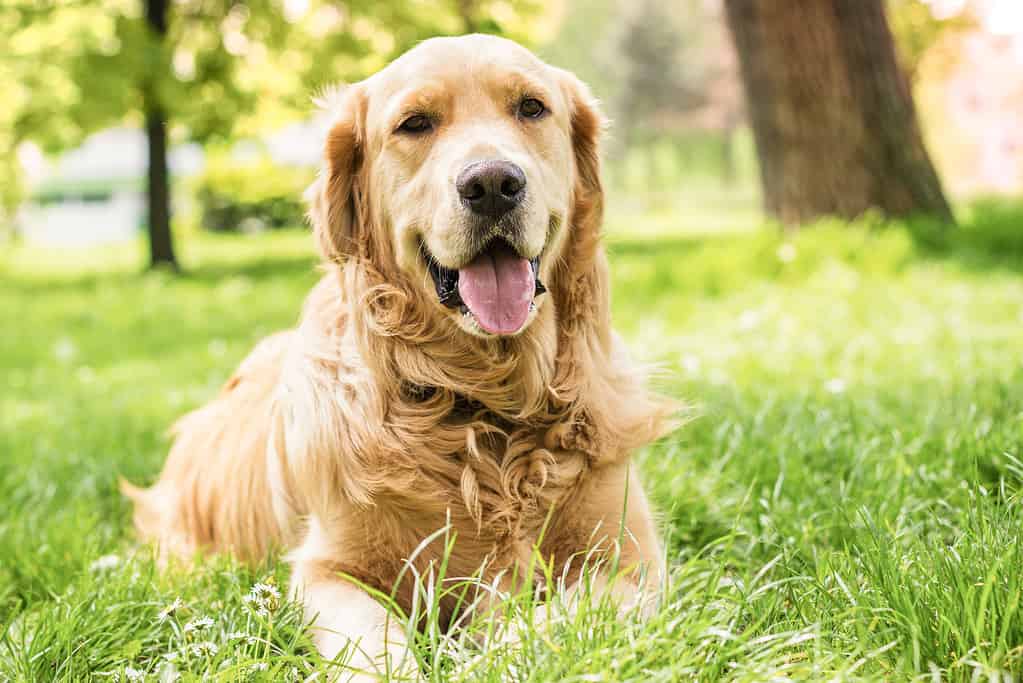
According to the American Kennel Club, the golden retriever is one of the most popular breeds in the United States.
©sanjagrujic/iStock via Getty Images
The first training day will be when you bring your golden retriever puppy home. This is typically around eight or nine weeks, and it’s imperative to start immediately. Here is a monthly breakdown of your golden retriever’s development and a general training timeline:
Month 1: At this point, you won’t have your golden retriever puppy yet. Its biological mother is still feeding, cleaning, and caring for her litter. Littermates teach your puppy how to communicate and play, and your breeder may also start a potty routine.
Month 2: Throughout this month, your puppy will continue to develop with its littermates. They will become rambunctious, and their sharp teeth will start to form. Toward the end of this month, you will welcome your puppy into its new home. Let the training begin!
Month 3: Immediately, start teaching your golden retriever puppy its name. This will make training easier because they know who they are and when you’re trying to communicate. Start a potty training routine to establish timing and where it is appropriate for your puppy to relieve itself. Many people choose to start crate training now as well.
Month 4: Many consider this time the “Angel Phase” of puppyhood. Your puppy is energetic, but small enough to physically handle when necessary. Use this time to bond with your puppy and learn their personal instincts. As you work on basic training, observe how your puppy interacts with other animals and people and note training priorities.
Month 5: By now, your puppy understands the boundaries of its new home. It should understand basic commands (sit, stay, drop it, etc.). Potty training is still ongoing, but accidents shouldn’t happen as often. Continue to add basic commands and work on tricks if desired.
Because of the golden retriever’s iconic coat, expect a lot of grooming in your future. This is a great time to start introducing your puppy to grooming tools like brushes, combs, and nail clippers.
Month 6: At six months, your golden retriever puppy has a short attention span. Basic commands will be routine, and they should understand your potty-time expectations. As you continue to train, remember golden retrievers can be sensitive. Positive reinforcement is key during training sessions.
As they lose puppy teeth and adult teeth grow in place, your puppy will start to chew. Always have toys available for chewing and immediately correct your puppy when they are excessively chewing household items or furniture.
Month 7: Begin to build on the foundation you established during the first six months of training. Golden retrievers become defiant at this age, so consistent training and activity are important. Continue socializing your puppy and constantly introduce it to new surroundings, animals, and people.
Month 8: With the basics established, now you can start adding fun commands while training your golden retriever. Exercise needs will increase, so it’s the best time to start working on other aspects of training like field work, obedience, recall, or fetch. This type of training is dependent on your individual lifestyle.
Months 9-11: Training may feel repetitive at this point, but that’s a good thing. Repetition drives the training home and your puppy will eventually respond to commands without thinking. Muscle memory is important, especially for safety commands like come and leave it.
Month 12: Continue to ensure your puppy understands the basics. You can also now focus on other training aspects you want to incorporate into your lifestyle. You and your puppy should have a strong bond, and they should understand that you are in charge. Always use positive reinforcement, and incorporate weekly grooming sessions so their coat is easy to maintain in adulthood.
As always, remember to consult your vet for training advice, appropriate vaccines, and questions you have about your golden retriever puppy. The guide above is general advice, but results may vary based on the individual dog.
Is a golden retriever easy to train?
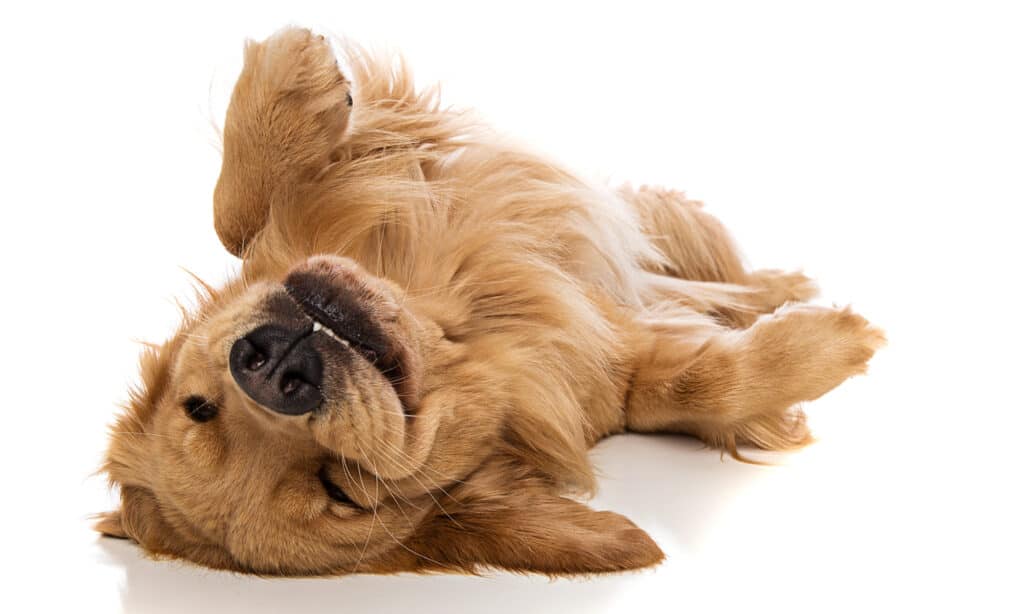
Golden retrievers are easy to train because of their intelligence and desire to please their human companions.
©MPH Photos/Shutterstock.com
With an eagerness to please, golden retrievers are easy to train. All puppies come with challenges, but golden retrievers are easy dogs to train, especially as your first dog. Originally bred to retrieve small game animals, their obedience drive is high. Golden retrievers bond quickly with their human companions.
They can be sensitive, so positive reinforcement is important during training sessions. Early training combined with consistent commands will result in a well-behaved puppy. Regular exercise and mental stimulation will avoid destruction as they grow.
What is the best method of training a golden retriever?
Many golden retriever enthusiasts recommend clicker training with your puppy. A clicker is an effective tool for positive reinforcement training, and it is simple to use. When your puppy responds to a command correctly, use the clicker while praising your golden retriever. Eventually, your puppy will associate the clicker with a job well done.
If clicker training isn’t in your path, just remember consistency is key. Working to build a foundation of good behavior with your puppy doesn’t have to be fancy. Start with the basics, and build from there.
Commands to Teach Your Golden Retriever
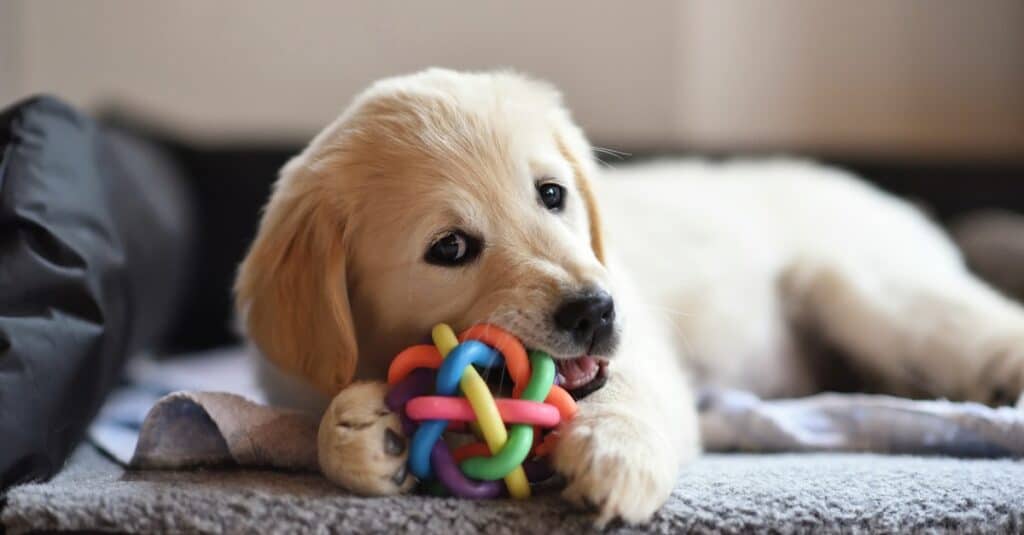
Golden retrievers are sporting dogs and are often used for hunting and field trials.
©iStock.com/Photology1971
Many commands you choose to teach while training your golden retriever will depend on your lifestyle and personal goals for your puppy. Still, there are consistent basic commands every dog should know and understand.
Obedience Commands
To achieve a well-behaved dog, obedience commands are crucial during training sessions. After they master the basics of sit, stay, no, and come, begin adding the following to their vocabulary:
- Down/off
- Wait
- Watch me
- Drop/out
- Leave it/drop it
- Lay down
- Heel
Start with obedience commands while establishing dominance with your puppy, and always reward with treats and praise. Remember to use the commands in real-life situations during socialization. This will help your puppy better understand good behavior.
Tricks
While tricks aren’t necessary to train, they help bond you closer to your golden retriever. This breed has the desire to please, so they respond well when asked to perform basic tricks. Consider adding the following to your training sessions.
- Rollover
- Spin
- Fetch
- Paw/shake
- Speak
Also, note that the fetch command is extremely useful with a golden retriever. Retrieving is in their instincts, so playing fetch comes naturally. Playing fetch is a great way to give your golden retriever both physical and mental exercise.
Locations
Location-specific commands help your golden retriever understand where they should go. Knowing the different locations in your home provides your puppy with clear guidance when you command them to go to a specific place. Common location-specific commands include:
- Crate
- Bed/bedroom
- Inside
- Outside
- Car
Positive reinforcement during crate training will help your puppy associate their crate with rewards and safety. Helping your puppy understand the crate is not a punishment will give them a sense of security. It will also give you peace of mind knowing your puppy is safe and secure when you’re away from home.
Some people also use the command place. This commands your puppy to sit in a specific location and wait until you give the release command, such as okay. Place teaches your puppy to relax on cue and control their excitement.
Tips for Training Your Golden Retriever Puppy
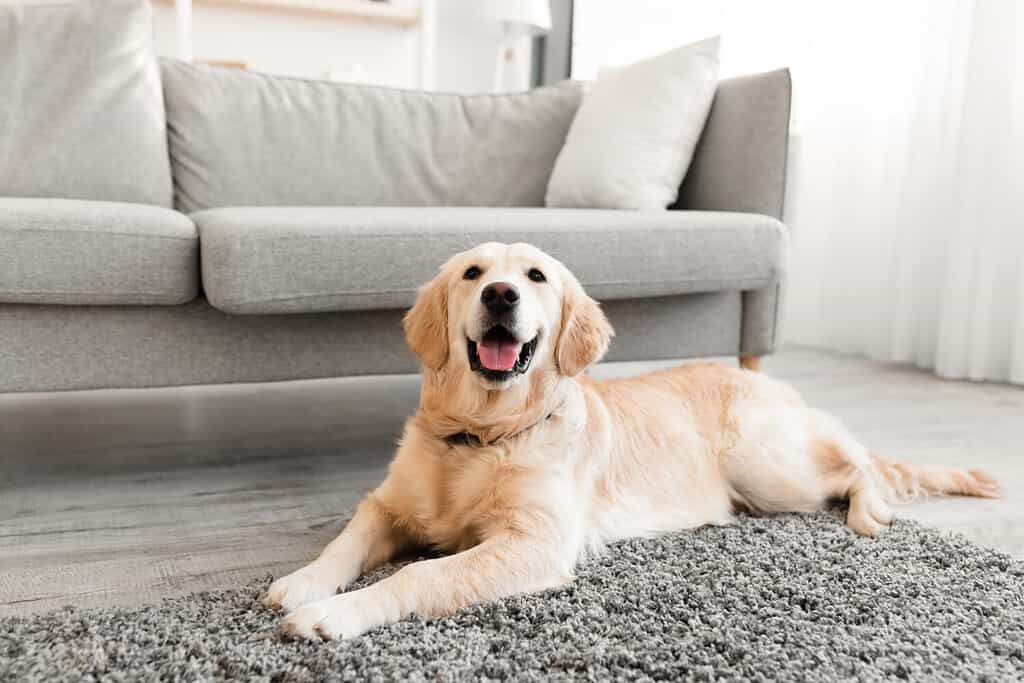
Golden retrievers are fast dogs and can reach speeds up to 35 miles per hour.
©Prostock-studio/Shutterstock.com
Training a puppy is not an easy feat, regardless of the temperament. While raising a puppy is a fun and exciting time for your family, early training will give you a well-behaved dog in the future. Here are a few tips for training your golden retriever puppy:
Do your research.
Don’t wait to research puppy training. Prepare in advance and have a good understanding of timing, puppy development, and training techniques. Develop a training timeline before bringing your puppy home, and purchase your supplies in advance.
Start early.
Training should start the moment you bring your puppy home. There is no denying golden retriever puppies are very cute, but don’t let that distract you. They will eventually grow into a large dog, and you don’t want destruction or poor behavior in your future.
Keep your golden retriever puppy close.
Puppies can be unpredictable. If you take your eyes off your golden retriever puppy for too long, there is a good chance you’ll find an accident or destruction somewhere in your home. Understand they need constant attention during the first few months.
Provide plenty of toys and chewing options.
It’s no secret that puppies like to chew. Provide toys and bones for your puppy to chew and play with, especially during the teething months. Consider freezing vegetables like carrots as something soothing to chew for your puppy’s gums.
Show your puppy a lot of love.
Golden retrievers are naturally loveable. Still, it’s important to reinforce that love and affection are welcome in your house. If your puppy wants to cuddle or show affection, honor this and reciprocate. This helps grow the bond with your puppy, and they will become a loving dog for the rest of their life.
Common Mistakes When Training Golden Retrievers
Even the most experienced trainers make mistakes. Below are some common mistakes people make when training a golden retriever:
Repeating commands.
It’s easy to repeat commands as you teach your puppy new vocabulary. While it is tempting to repeat a command, try to say it only once. Give the command and maintain eye contact. Wait for them to respond correctly, even if it takes a minute or two, then praise and use your clicker.
Not introducing the leash immediately.
Don’t wait! Leash training can be a challenge, regardless of the breed. Try introducing your puppy to the leash immediately, even if you clip it to the collar for a couple of minutes, and let them wander freely. The faster they get used to the feeling, the faster you can start teaching leash etiquette.
Not establishing a routine.
Routine is everything with puppy training. Establishing a routine early will help guarantee a successfully trained dog. Golden retrievers thrive on routine, and they like understanding their boundaries. Their routine includes potty time, meals, daily walks, and when and where to sleep.
Allowing your puppy to fail at potty training.
Potty training is the trainer’s responsibility. In the early phases of potty training, your puppy will not understand what they are doing wrong. It is your job to ensure they go to the appropriate spot to relieve themselves before it happens. Accidents are most likely to occur after meals or drinking, after playtime, or when they are first released from their crate.
Comparing yourself and your puppy to others.
Remember, all puppies are different. Try not to distract yourself with the progress of other puppies and focus on your own. Diet, genetics, exercise, and lifestyle all play significant roles in a puppy’s development. If your puppy is slow to progress, be patient. Take your time, and always respond with love and positive reinforcement. If bad behavior and slow development persist, consider speaking with your vet or a professional trainer.
When should I start training my golden retriever to hunt?
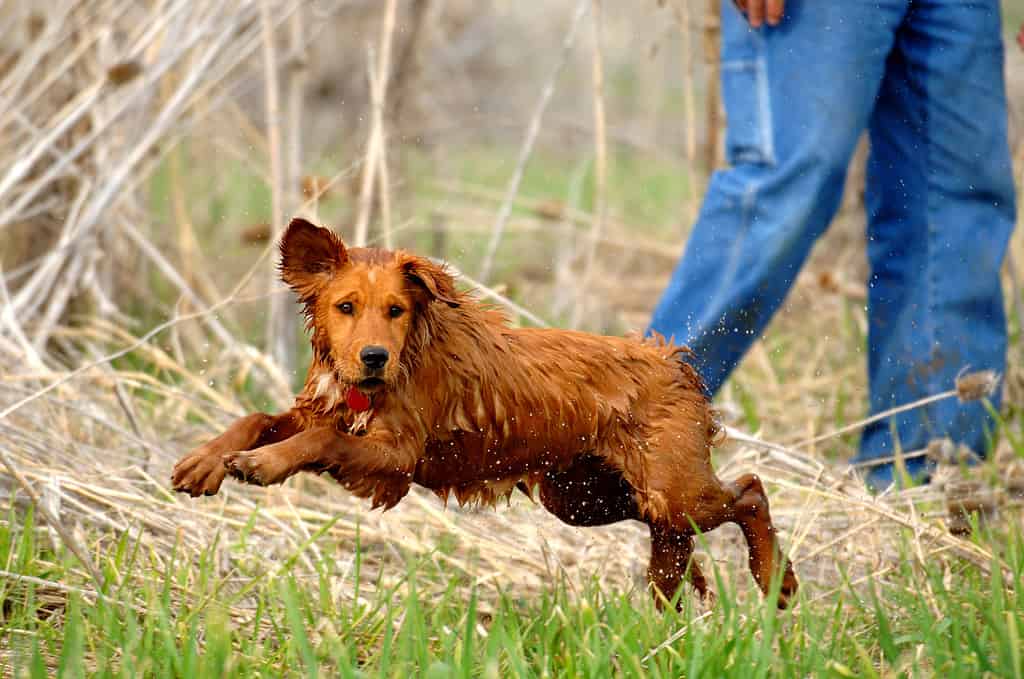
Golden retrievers originated in Scotland as gundogs to retrieve small game animals for hunters.
©Brent Paull/iStock via Getty Images
Bred originally as gundogs in Scotland, golden retrievers make excellent hunting dogs. If you’re considering hunting with your golden retriever, remember that obedience is the foundation for other types of training. Start with obedience training at eight or nine weeks and work to build on those basic skills.
During the early months, introduce your dog to different experiences to test their instincts. Allow them to become familiar with wild game, gunshots, water, and other aspects of your hunting lifestyle. Many then start to work on retrieval training around six or seven months.
How do I train my golden retriever as a service dog?
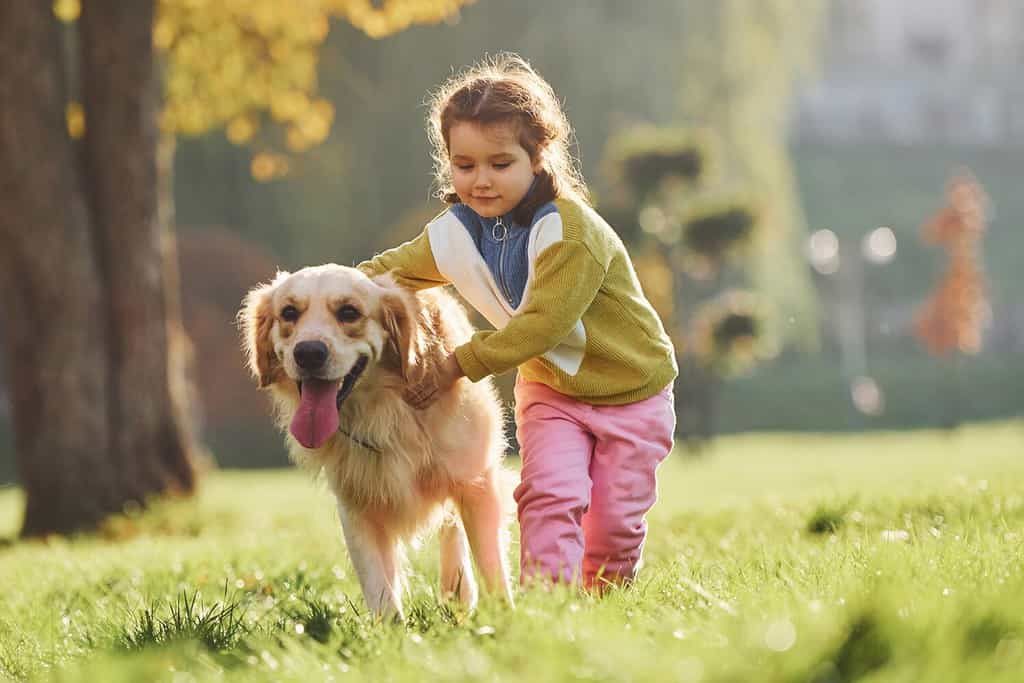
Golden retrievers are patient and friendly, making them the ideal therapy or service dog.
©Standret/Shutterstock.com
Golden retrievers make excellent service dogs because of their friendly demeanor and temperament. If you’re considering training your golden retriever as a service dog, first familiarize yourself with the different types of service dogs. All training starts with the basics, but different service dogs require different training and timing. Golden retrievers can work as guide dogs or even canine-assisted therapy dogs for military personnel.
Regardless of the path you choose, try to do your research prior to bringing your new puppy into your home. Develop a deep understanding of the training expectations so you can start immediately.
Up Next:
- Golden Retriever Grooming Guide
- Golden Retriever Exercise: Energy Level and How Much Activity They Need
- Golden Retriever Puppies: Pictures, Adoption Tips, and More!
The photo featured at the top of this post is © Nikaletto/Shutterstock.com
Ready to discover the top 10 cutest dog breeds in the entire world?
How about the fastest dogs, the largest dogs and those that are -- quite frankly -- just the kindest dogs on the planet? Each day, AZ Animals sends out lists just like this to our thousands of email subscribers. And the best part? It's FREE. Join today by entering your email below.
Thank you for reading! Have some feedback for us? Contact the AZ Animals editorial team.






